2025-10-13
Research uncovered 122 cases of limb loss across 58 lizard species and revealed that these “three-legged pirates” – the rare survivors of traumatic injuries – can run just as fast, maintain healthy body weight, reproduce successfully and live surprisingly
2025-10-23
Beyah has led the College of Engineering since 2021, strengthening its national and global reputation for innovation, research excellence, and student success.
2025-10-22
Microsoft's decision to end support for Windows 10 could lead to a massive increase in e-waste and expose users who can't upgrade to greater cybersecurity threats
2025-10-15
The award will support Stroud as he creates evolution’s first high-definition map — with the help of 1,000 backpack-wearing lizards.
2025-10-17
As global competitors pull ahead, Georgia Tech experts urge focus on safety and infrastructure for advanced air mobility.
2025-10-16
Two years into a $49.5 million cancer-mapping project, researchers are opening the door to new kinds of tests that could alert doctors to multiple kinds of cancer when they’re most treatable.
2025-10-13
“This course truly underscores Georgia Tech’s commitment to pioneering meaningful undergraduate experiences,” says teacher Vinayak (Vinny) Agarwal. “No other peer institution I know of is exposing undergraduates to bioinformatics at this level.”
2025-10-10
searchers have developed a method to break down PET, one of the world’s most widely used plastics, for sustainable recycling using mechanical forces instead of heat or harsh chemicals.
2025-10-06
A Georgia Tech CS professor is a co-author of a new OpenAI study that examines why large language models struggle to say, 'I don't know.'
2025-10-01
Three researchers from Georgia Tech's School of Interactive Computing (IC)—Cindy Lin, Lynn Dombrowski, and Shaowen Bardzell—were selected to present their paper at the highly selective Aarhus Conference in Denmark.








